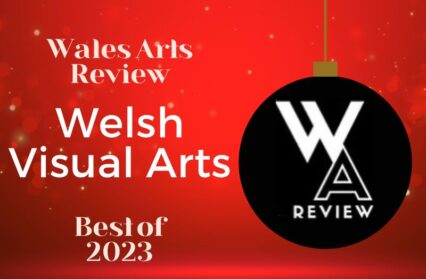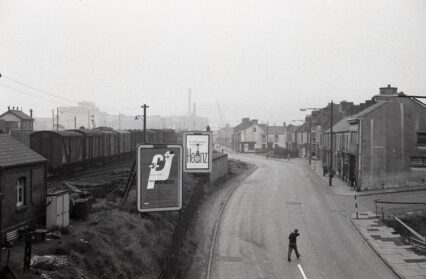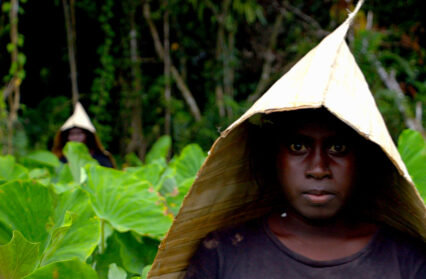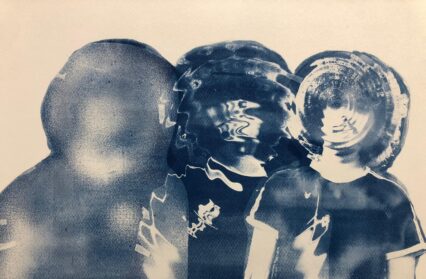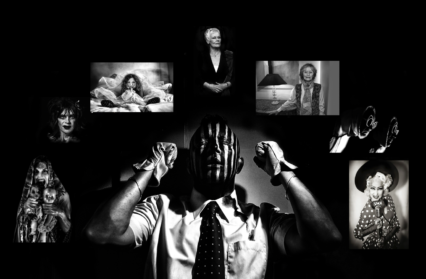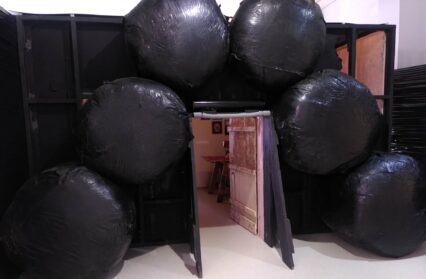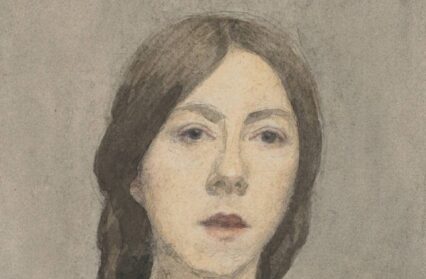
Beautiful mistakes happen when artistic vision combines with continuous experimentation to create a pathway. Opens a door to reveal hints of what lays under the surface, and what could be.
Camgymeriad Hardd / Beautiful Mistakes is the name of abstract artist Elfyn Lewis new solo exhibition that will be opening 12 June at Oriel Deg / Gallery Ten, Windsor Place, Cardiff.
Born in Porthmadog, Elfyn has spent the last twenty years living and working in Cardiff. Winner of the National Eisteddfod of Wales Gold Medal for Fine Art in 2009, and Welsh Artist of the Year 2010, Elfyn is undoubtedly one of Wales most talented and visually striking abstract painters.
I meet him in his studio, where he shows me the work that will be going on display. The studio is small, and the explosions of paint on walls, floors and Elfyn’s clothes is evidence if the physical process involved in creating the paintings. The tools are trowels, grinders, brushes, tape, and the paint is manipulated onto the surface. Dragged and pushed. Paintings line the walls, they lay on shelves drying, waiting for another layer of paint, another hour of attention and hope that the process will bring something beautiful to the surface. One wall is lined with CDs, and The Disposable Heroes of Hiphoprisy play while we talk.
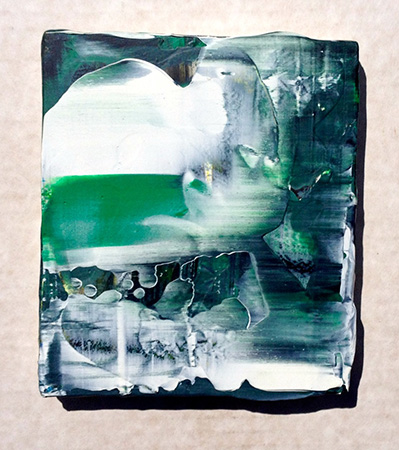
*
Elfyn Lewis: I don’t think you enjoy art as I child, because there are so many limitations on what you are allowed to do in school. It can be very conservative. They don’t always expect much of you. I suppose I liked just being left to my own devices. In secondary school I had a very good art teacher, and I think that’s when the penny dropped. You are searching aren’t you? All children are. It doesn’t stop as adults. You search for something that is valid. Something you want to do.
I think what influenced me even more was Cob Records. I was into heavy and alternative stuff, so I used to be in there all the time. That was where kids my age would go and hang out, and listen to the music. It was just seeing the art on the covers. Being in a place where people thought a bit differently. I suppose it was like a gallery in a way. And that size. That 12 inch square size. I still paint on that, and I really like it.
Sarah King: Did you get support?
Not really. Not through lack of love or understanding, but we aren’t from a middle class background. We were working class, and there was work to be done. I used to enjoy drawing at night in my bedroom. When I was 16 I went for an interview to go to art college in Bangor, but I walked out on the interview and thumbed it home. I went back two years later, and I’d worked hard and knew by then it was what I wanted to do. So it is a combination of being left to my own devices, no one expecting that much of you, but still having that security of the family and friends.
How did you move into abstract art?
In College my work was more figurative, but still with a twist to it. Confidence has a lot to do with being a painter. In ’96 I started an MA in Cardiff, and I’d just had enough of questioning myself ‘am I an artist or not?’ I went back to using colours, and pared it down and became a lot more minimalist. It grew from there. Just experimenting, using different tools.
When did you feel you could call yourself an artist?
I’m always wary of it, but I think in my mid 30s I might have said it. Whether I believed it or not. You have to be careful, because I think there are a lot of people where the hype and the self promotion is more important than the actual work. It takes time to be an artist.
Were there any artists that inspired you to move in the abstract direction?
Over the years there have been many. I suppose with me a big influence has been Richter, and Hoyland. I was massively into Rothko and Pollock. American abstract expressionism. It’s not just painters. You need people, and a way of thinking, and I have been very fortunate to have had people over the course of my life who have helped me in different ways. But you are always questioning. Trying to push things forward.
What pushes the work you do now forward?
I don’t know if it’s a craving…but you need something to come out of it. It’s like a job. You go in. There a periods that can be very fruitful, but then you have periods that are not. And they can be just as important. It’s difficult. Sometimes you can’t see the wood for the trees with what you are doing, and you have to be careful to not repeat yourself. You have to have judgement and quality control. Sometimes you need space for things to breathe and just develop. Not just on the canvas, but in your head as well. I don’t know if that platform exists here. I’d like to think it exists in Wales, but I’m not sure it does.
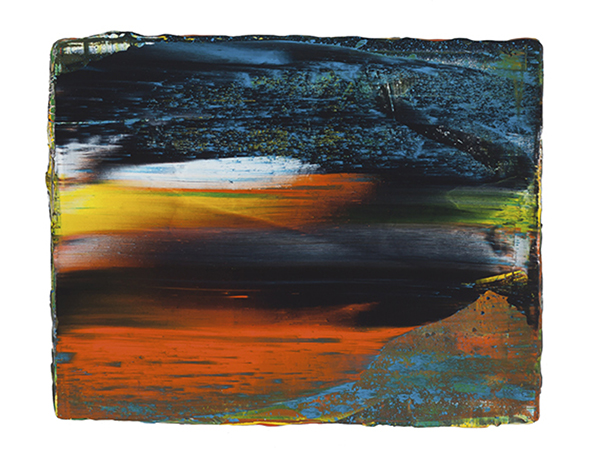
A platform for abstract art?
I think people are trying. You just have to give people something different. There are other ways of looking at the world. I think alot of the galleries sell the same kind of work. I know they want to make a living, but that just means that the public tends to buy a lot of the same kind of art, so you just have to try to do something different. It’s not rocket science is it? You just have to believe in what you are doing, and try to keep progressing and be true to yourself and your work. Once you start painting and creating, once you start on the journey, there will be detours along the way. Like if you are a writer or an actor. Jobs come and jobs go. You depend on people, we all do. You depend on people to be sympathetic to what you are doing. Buy your work, push your work. There is a a lot of good work being made here, and I think things are changing…but it can’t come quick enough. You’ll lose people won’t you? They’ll either give up or move away.
Art in Wales has really come on in the last twenty years. There are a lot of good people out there doing work, it just needs more investment. Things like the Biennale. They give that to people who have a really thin tenure to Wales. They give it to people like John Cale. All due respect, but what the fuck does he need it for? There is a lot of this stuff that goes on. The powers that be don’t seem to have enough faith in people that actually choose to stay and work here. They are the ones that deserve a medal, or deserve the grants and backing. It’s a kick in the teeth. Why don’t we champion the people who live here? I don’t just mean the arts council, but the galleries as well. I still don’t think the critique is there for art in Wales. Literature and film is a different matter, But I don’t see any real critique if painting.
How important is the studio to your practice?
Most important really. It’s the best thing. Time in the studio painting. What more do you want? It can be frustrating a lot of the time, but there can be something calming about it. It stops you thinking about yourself.
It’s good to go and work somewhere. At home you have distractions. The phone rings. There, I can close the door, have the music on, and it takes you somewhere. It takes you somewhere you need to go. Sometimes a lot of dead ends. It’s a very insular world you live in as a painter.
Your work seems to be going through a period of change at the moment.
Yes definitely. You have to try to develop. It might not look it on the outside, but I know it. It’s just the tip of the iceberg. I would like to take it further, but with artists things take time. I always want more. It’s like Turner trying to capture the sun. I need it.
How does it develop?
I’m a processed based painter. I go in to the studio and work. Of course I’m influenced by other artists. It’s like being a musician. Here’s three chords, off you go. It’s not like I’ve invented the wheel. It’s all there. It’s a type of language. Expressing how you feel. Words are handy, but it’s emotional.
I don’t always completely understand what I do myself, I can talk about it to a certain extent, but I don’t really, and truly understand it myself. I just know that it’s something I have to do. It gives me a peace. It can be frustrating, but takes you somewhere where you stop thinking about yourself. I suppose it’s like going to church, and having that religious experience. There is a lot of solitude involved.
Do you chase that feeling of when it works?
Yes, it’s like a drug. It’s addictive. But it gets further away from you sometimes. It’s like you are swimming from land, further from shore. Sometimes you float along, other times you get pulled back to sea.
Your paintings often get described as abstract landscaped. How do you feel about that?
I don’t know. I think people have to read them. Like with everything people will try to make sense of things. I’ve said it myself, and I suppose I can hide behind it. I like when they just take you away from everything. People will try to see something in them, I suppose. ‘There is a line there, that must be the horizon, that must be the sky coming down, or that’s the shape of a mountain’ which is fine.
You try to have a conversation with people through the work. You hope it does something for them. Makes them think.
The area where I’m from means a lot to me, and I know that has influenced my work subconsciously. The naming of the paintings; using places, peoples names. The landscape changes. People come and go. It takes a long time, but it does change.
You have won two of the most prestigious awards in Wales. What does that mean to you and your practice?
I suppose when you win anything it means recognition. The Eisteddfod, as a Welsh speaker, is of course important to me, but I think it probably means more to my family. It’s pot luck really. It doesn’t necessarily gauge how good you are. Some of the work that win is terrible. The work that I won with, I don’t think is my best work. It’s just the right time at the right place. At that point in time you were deemed the best thing there. It’s a judgement call, simple as that. You’ve got to take it as it comes. When it comes in it’s great, but most of the time it doesn’t and you can’t throw your toys out the pram.
You wait for a burst, and nothing happens for years, and suddenly it does. As a painter you have to mature, and people have to get used to what you are doing. It’s your journey as a painter, and people come on to it or they don’t.
A lot of commercial galleries cater for that chocolate box painting, so people will paint in that style. It’s important you have your own style, though I don’t like to use that term. Why would I want to be like anyone else?
*
Elfyn is not like anyone else. His work has, for want of better word, a distinct and strong visual style and is striking and recognisable.
The process is evident. These are physical paintings. Tangible in the energy, aggression and movement of the blade. Physical in the richness and depth. You want to touch. Feel the curves, drips and rich congealed paint. Objects that draw you into a darkness and explosion of colour and contrast. Beautiful and mysterious. Sometimes calming, but at times unsettling.
The paintings are often called abstract landscapes, and with certain paintings the description is understandable, but it does the work an injustice. The work is far deeper, more emotionally charged and more considered than that. It’s human nature to look for beauty, and something to relate to, and you can sidestep the longing, anger and sadness and focus on the physical beauty, tenderness and brightness that is also, without doubt, evident.
Central to the show is a collection of paintings on paper. An experimentation and progression for Elfyn who usually works on MDF board. The thickness and objectification of paint is restrained, and the layering is brought to the forefront of the process to create paintings that a far more angular with powerful blocks of colour. The dragging of the paint is an effect rather than the overall creative process, and the lines are strong and controlled.
The two that instantly caught my attention were ‘Y Cyfan’ and ‘Osgoi’.
‘Osgoi’ is striking with it’s luscious red and gold against black and white. It feels sumptious and busy at the same time. Like a glimpse caught out the corner of your eye.
‘Y Cyfan’ works with a recognisable colour contrast of Elfyn’s. The block of orange against blue. But flecks of black makes it feel almost out of focus, juxtaposed with strong, straight lines.
Of the paintings on MDF I was most struck by ‘Y Pla Gwyn’, ‘Nofio’, ‘Melys’ and ‘Tyner’.
‘Tyner’ and ‘Melys’ are both aggressive and gestural paintings with thick curves and strong contrast. ‘Nofio’ a dark, eerie example of the effect of the paint being dragged across the board. ‘Y Pla Gwyn’ is the quiet in the middle of the storm. There is a beautiful, dark calmness to it. Like dusk. Like that moment when everything stands still and you exist in the borderlands between night and day, dark and light. It can be a bit scary, but it is inevitable. The juxtaposition makes it stand out, and is an example of how the whole mood and tone of the paintings can change dramatically, but still look distinctly like Elfyn’s work.
There is integrity in the paintings. The need for the artist to express something, connect and communicate gives it a vulnerability that only comes through exposing yourself and being honest. Honesty is attractive in art. It makes the viewer feel privy to the process and what, and who the artist is.
What is it about? What does it mean? That is what the viewer will ask themselves when they look at abstract paintings. As a viewer the journey is as much yours. The feelings the paintings evoke, and the images you see in them are just as valid and true as anyone elses. The most important thing as that you see what you want to see, and feel what you want to feel. Not what anyone else tells you to see. The world is full of colour, darkness, peace, aggression, beauty…and beautiful mistakes, and the painting are a window into something or someone else. A fragment of what lies beneath the surface.
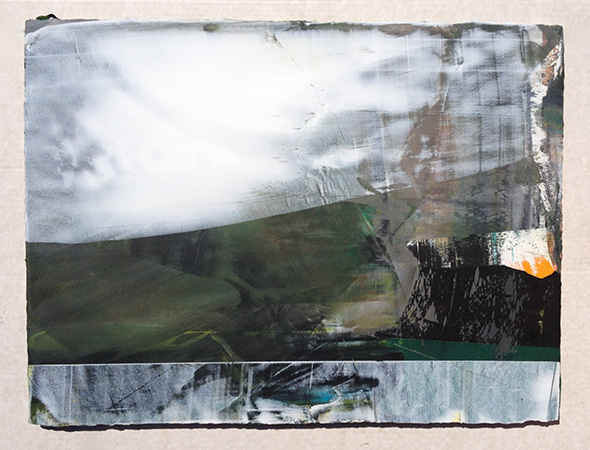
Camgymeriad Hardd / Beautiful Mistakes is on show from 12 June until 12 July, and I highly, highly recommend visiting it.


